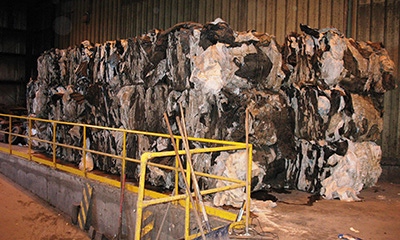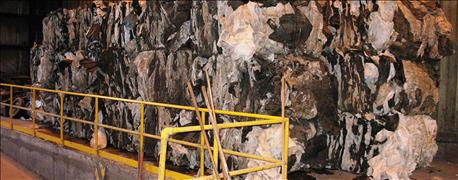April 26, 2016

The use of silo bags, bunkers and wrapped bales has increased dramatically on Wisconsin dairy and livestock farms over the past 10 years. Low density polyethylene plastic film has provided farmers with a low-cost method for storing high quality forages and estimates are that over 55 million pounds of LDPE plastic in the form of silo bags, bale wraps and bunker covers are sold annually to Wisconsin farmers. While the use of plastic on farms has proven popular the disposal of used agriculture plastic film has become a big issue on many farms.

PLASTIC BALES: Green County bales the used ag plastic into 1-ton bales which are then sent to a processing facility in Arkansas where it is cleaned, processed and recycled into trash can liners and other plastic products.
Statewide survey
A statewide survey conducted by Extension and Wisconsin Department of Natural Resources in 2015, reported that approximately two-thirds of the farmers used landfills for disposing of their used ag plastic. The second most common method of disposal was burning at 30%, with only 10% reporting that it was recycled. More than 1,500 farms and greenhouses participated in the survey.
Burning ag plastic is not only illegal, but it also releases toxic and potentially cancer-causing chemicals such as dioxins and furans into the air. These toxins can then be inhaled by humans and animals and deposited in soil and surface water. Residue from burning contaminates the soil and groundwater and can enter the human food chain through crops and livestock. Unburned portions of the plastic also become litter on the ground, with larger piles of plastic becoming a breeding ground and habitat for mosquitoes.
The survey also indicated that 85% of the farmers are willing to haul their plastic to a collection site for recycling. Our ag plastic collection programs in Green County have confirmed that many farmers will drive up to 30 miles to have their plastic recycled if there is no charge to dispose of it. Therefore, we have a lot of used ag plastic on farms and most farmers preferring to see it recycled versus burning or paying up to $1,500 per year to place it in a landfill.
So why are we not recycling more ag plastic in the state?
The major challenge in recycling used ag plastic films is getting it from the farm to a collection facility for baling. Green County started recycling ag plastics in 2014 by having spring and fall collections in which area farmers could dispose of their used ag plastic films free of charge by hauling it to our local landfill. We have collected more than 250,000 pounds of used ag plastic over the past two years and recently expanded our collection program to accepting used ag plastic every Wednesday from any area farmers who are willing to haul it to our facility.
Baled plastic
Green County bales the used ag plastic into 1-ton bales which are then sent to a processing facility in Arkansas where it is cleaned, processed and recycled into trash can liners and other plastic products. Having access to a large baler is a must for having a plastic collection program since the plastic needs to be baled for transport to any processing facility. There are several other counties in the state that also offer or are considering a recycling program for ag plastics. Contact your county Extension office to see if a program exists in your county.
Only #4 plastic from silo bags, bunker covers, green house covers, drip tape and bale wraps is accepted through our collection. Plastic twine, mesh bale wraps, plastic jugs, bunker covers with scrim nylon and all other types of plastic containers are not being accepted. Newer technology for plastic processing has solved the cleanliness issues with ag plastics. However, farmers are asked to shake any excess mud, gravel, dirt, stones and feed off the plastic before storing it. We also encourage them to landfill the bottom portion of silo bags because of the high amount of dirt and feed associated with that portion of the bag.
An even more attractive option for Ag plastic disposal is being planned for a roll out in Wisconsin this summer. Extension worked on a pilot program with Revolution Plastics in 2015 in which free dumpsters were provided and placed on 88 farms in Wisconsin and Illinois specifically for storing these types of plastic. The program also included free on-farm pick-up. Due to the success of the pilot program the company now plans to offer this program to several hundred more farmers in Wisconsin in 2016.
Green County will serve as the hub for the rollout of this new program and farmers within a 100-mile radius of Green County will be given first chance to participate in this free recycling program offered through Revolution Plastics. After farmers in the immediate area are served they will then expand out to other areas in the state.
Dairy and livestock farmers interested in enrolling in the program that provides free use of a dumpster and on-farm pick up can register to get on a waiting list by going to the Revolution Plastics web site at: http://www.revolutionplastics.com/
This program certainly has the makings of being a win-win for everyone involved. It will enable farmers to dispose of their used ag plastic at no cost, reduce the amount of plastic going to landfills and reduce the amount of plastic being illegally burned, while at the same time recycling the unwanted material into new products.
Mayer is the Green County Extension dairy and livestock agent.
You May Also Like




